In recent years, the culinary landscape has been significantly transformed by the emergence of high-quality, professional appliances. Among these, the Belgian waffle machine has become a staple in the foodservice industry, offering a unique, delectable treat that has captivated both diners and chefs alike. This article delves into the factors contributing to the Belgian waffle machine’s popularity, the market trends that are shaping its segment, and the innovative features that set these machines apart from their counterparts. We’ll also explore how consumer preferences and market segmentation play a crucial role in the industry’s growth, delve into case studies showcasing successful implementations in the hospitality sector, and discuss the challenges and opportunities that lie ahead for professional Belgian waffle machines. Additionally, we’ll take a glimpse into the future, predicting what advancements and trends might lie in store for these beloved appliances.
The Rise of the Professional Belgian Waffle Machine in the US and European Markets
The professional Belgian waffle machine has experienced a remarkable surge in popularity across the US and European markets. Once a niche product favored by home bakers and specialty cafes, these machines have now become a staple in professional kitchens, from gourmet bakeries to upscale restaurants and even catering services. Let’s delve into the factors that have contributed to this rise and the impact it’s had on both the culinary landscape and consumer preferences.
The allure of the Belgian waffle lies in its rich history and cultural significance. Originating in Belgium, these waffles are known for their distinctive shape, with deep pockets that perfectly hold melted butter, maple syrup, or any other toppings. This unique design, combined with the delicious taste, has made the Belgian waffle a favorite among waffle enthusiasts worldwide.
In recent years, the US and European markets have seen a growing demand for high-quality, professional-grade appliances that can produce these delectable treats consistently. This demand has been driven by several key factors. First and foremost, the foodservice industry has become increasingly competitive, with operators looking for ways to differentiate their offerings and attract more customers. The introduction of professional Belgian waffle machines has provided them with a unique selling point.
Moreover, the health and wellness trend has influenced consumer preferences, with more people seeking out lighter, healthier options for breakfast and desserts. Belgian waffles, with their ability to be made with whole grains or alternative flours, have become a versatile choice for those looking to indulge without feeling guilty. This has opened up a new market segment for professional waffle machines, catering to health-conscious consumers.
The technology behind professional Belgian waffle machines has also evolved, making them more efficient and user-friendly. Modern machines come with features like non-stick surfaces, precise temperature controls, and even timers for perfect browning. These advancements have not only improved the quality of the waffles but have also reduced the labor involved in their preparation, making them an attractive investment for businesses.
In the US, the professional Belgian waffle machine market has seen significant growth, especially in coastal cities and urban centers where there’s a strong emphasis on artisanal and gourmet food. The demand has been fueled by the rise of food trucks, pop-up cafes, and food festivals, all of which have embraced the Belgian waffle as a must-have item on their menus.
Similarly, in Europe, the market for professional Belgian waffle machines has expanded rapidly. Countries like the Netherlands, Germany, and the UK have seen a surge in demand, with both local and international brands vying for market share. The European market is particularly interested in machines that can produce both traditional Belgian waffles and other variations, such as the Liege waffle or the American-style waffle.
Another contributing factor to the rise of the professional Belgian waffle machine is the rise of social media and food blogs. The visual appeal of perfectly golden waffles with toppings that ooze with flavor has made these treats highly shareable. Chefs and food enthusiasts often showcase their creations online, driving curiosity and interest among consumers, who in turn seek out these machines to replicate the experience at home or in their own establishments.
Despite the growth, the market is not without its challenges. Competition is fierce, and manufacturers must constantly innovate to keep up with consumer demands and industry trends. Additionally, there’s a need for proper training and support for operators to maximize the potential of these machines. However, the opportunities for growth remain vast, as the demand for high-quality, unique food items continues to rise.
In conclusion, the professional Belgian waffle machine has ascended to new heights in the US and European markets, driven by a combination of factors including culinary innovation, health trends, and consumer interest. As the market continues to evolve, we can expect to see further advancements in technology, new flavors, and a greater emphasis on sustainability. The future looks bright for the professional Belgian waffle machine, as it continues to play a key role in shaping the foodservice industry.
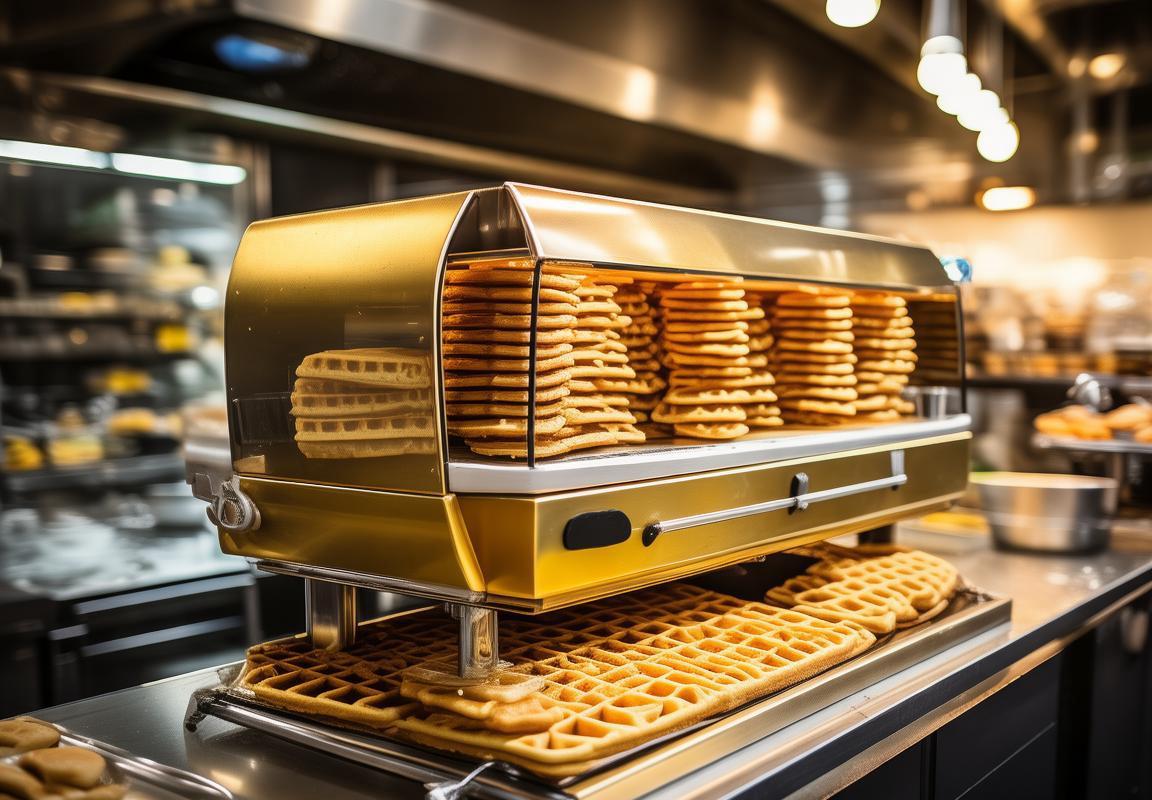
Understanding the Belgian Waffle’s Popularity
The Belgian waffle’s popularity is a story woven with a tapestry of rich history, culinary innovation, and a distinct cultural allure. Its golden, crispy exterior and tender, fluffy interior have captivated palates across the globe, especially in the US and European markets.
Belgian waffles, with their unique grid pattern, stand out from their flatter counterparts. This distinctive design isn’t just for show; it’s a functional feature that creates pockets of air, making each bite airy and light. The intricate pattern also allows for the perfect distribution of toppings, from sweet syrups to fresh fruits and whipped cream.
One cannot overlook the role of tradition in the waffle’s rise to fame. Originating in Belgium, the country’s culinary heritage is deeply rooted in the art of waffle-making. Over centuries, the craft has been passed down through generations, refining techniques and flavors. This heritage has given the Belgian waffle its iconic status, making it a symbol of Belgian pride and a cherished treat.
In the US, the Belgian waffle’s popularity soared during the 1960s and 1970s, coinciding with the rise of the coffee shop culture. These shops, often featuring a selection of Belgian waffles, became a staple in the American diet, offering a sweet alternative to the traditional breakfast options. The convenience of these shops, coupled with the novelty of the waffle’s taste and texture, made it a breakfast favorite.
The European market has also embraced the Belgian waffle, though in a slightly different manner. In countries like France and the Netherlands, waffles are often enjoyed as a dessert or a sweet treat during festive occasions. The cultural significance of the waffle in these countries adds to its allure, making it more than just a snack.
The versatility of the Belgian waffle is another factor contributing to its widespread appeal. It’s not limited to breakfast; it can be a dessert, a snack, or even a main course. From sweet toppings like fresh berries and chocolate sauce to savory options like ham and cheese, the possibilities are endless. This adaptability has allowed the waffle to find its way into various culinary settings, from cafes to gourmet restaurants.
Moreover, the rise of food influencers and social media has played a significant role in the Belgian waffle’s popularity. Chefs and home cooks alike have showcased their waffle-making skills, often experimenting with new flavors and designs. These visual presentations have not only inspired enthusiasts but have also contributed to the waffle’s image as a trendy and indulgent treat.
Health consciousness has also influenced the Belgian waffle’s popularity. While the traditional version is indeed a treat, the market has responded with healthier options. Whole grain versions, gluten-free waffles, and even low-calorie alternatives have become increasingly available, catering to a broader audience. This shift towards healthier eating habits has not diminished the waffle’s charm but has instead expanded its reach.
The global culinary landscape has also contributed to the Belgian waffle’s popularity. As people travel more and explore different cultures, they bring back flavors and recipes from around the world. The Belgian waffle, with its universal appeal, has become a part of this global culinary exchange, making it a familiar and comforting treat in various corners of the globe.
In conclusion, the Belgian waffle’s popularity is a multifaceted phenomenon. Its rich heritage, unique texture, versatility, and the influence of modern culture have all played a part in its rise to fame. Whether it’s a breakfast staple, a festive treat, or a trendy dessert, the Belgian waffle continues to captivate the hearts and taste buds of people everywhere.

Market Dynamics: Trends Shaping the Professional Belgian Waffle Machine Segment
The professional Belgian waffle machine segment has been experiencing a surge in popularity, driven by a variety of market dynamics that are reshaping the industry. Here’s a closer look at some of the key trends influencing this segment:
Waffle Culture GrowsCultural shifts have played a significant role in the rise of professional Belgian waffle machines. As people seek out unique dining experiences, the traditional Belgian waffle has become a staple in cafes, restaurants, and food trucks. This cultural fascination with the waffle’s crispy texture and sweet, gooey center has fueled demand for high-quality machines that can produce these iconic treats.
Technological AdvancementsTechnological innovation has been a game-changer for the professional waffle machine segment. Modern machines now come with features like programmable temperature settings, non-stick surfaces, and automatic shut-off functions, making them more reliable and user-friendly. These advancements have allowed for consistent and high-quality waffles, which is crucial in a competitive market.
Health and Wellness MovementThe health and wellness movement has also had a profound impact on the professional Belgian waffle machine market. Consumers are increasingly looking for healthier options, and while traditional waffles are often high in calories and sugar, the market has seen a rise in low-carb, gluten-free, and even vegan waffle options. This shift has prompted manufacturers to develop machines that can accommodate these dietary trends.
Hospitality Industry IntegrationThe hospitality industry has been quick to embrace the professional Belgian waffle machine. From breakfast buffets to special event catering, waffles have become a sought-after menu item. The ability to quickly and efficiently serve large quantities of waffles has made these machines an essential tool for restaurants, hotels, and event venues. This integration has expanded the market beyond individual consumers to include commercial kitchens.
E-commerce ExpansionThe rise of e-commerce has provided a new channel for professional waffle machine sales. Online retailers have made it easier for small businesses and home bakers to access high-quality machines at competitive prices. This accessibility has democratized the market, allowing entrepreneurs to start their own waffle businesses with minimal upfront investment.
Seasonal Demand FluctuationsSeasonality is a significant factor in the professional Belgian waffle machine segment. The demand for waffles tends to spike during the holiday season, particularly around Christmas and New Year’s. This seasonal trend requires manufacturers and distributors to anticipate and plan for increased production and inventory levels to meet the surge in demand.
Sustainability InitiativesSustainability has become a key concern for consumers and businesses alike. Professional waffle machines that are energy-efficient and made with sustainable materials are increasingly popular. This focus on environmental responsibility has led to the development of eco-friendly machines that not only meet performance standards but also align with the values of environmentally conscious customers.
Customization and PersonalizationPersonalization is a growing trend in the food industry, and the professional Belgian waffle machine segment is no exception. Customization options, such as interchangeable plates for different waffle shapes and sizes, allow businesses to cater to a wider range of preferences. This trend has encouraged manufacturers to offer a variety of machines that can accommodate unique design requests and branding opportunities.
Innovation in Flavors and IngredientsThe professional Belgian waffle machine market is not just about the hardware; it’s also about the flavors and ingredients. There’s a growing interest in experimenting with new flavors and ingredients, from classic maple syrup to exotic syrups and fillings. This has spurred innovation in the industry, with some manufacturers offering machines that can handle a wide range of toppings and batters.
Globalization of Food TrendsGlobalization has brought a wealth of international food trends to the forefront. The Belgian waffle, with its origins in Belgium, has transcended its European roots and become a global phenomenon. This has opened up opportunities for manufacturers to tap into emerging markets where there is a growing interest in European-style pastries and breakfast items.
The rise of the professional Belgian waffle machine segment is a testament to the dynamic nature of the food service industry. It’s a market that continues to evolve, influenced by cultural shifts, technological advancements, and changing consumer preferences. As these trends continue to shape the industry, it’s clear that the professional Belgian waffle machine will remain a key player in the world of foodservice.
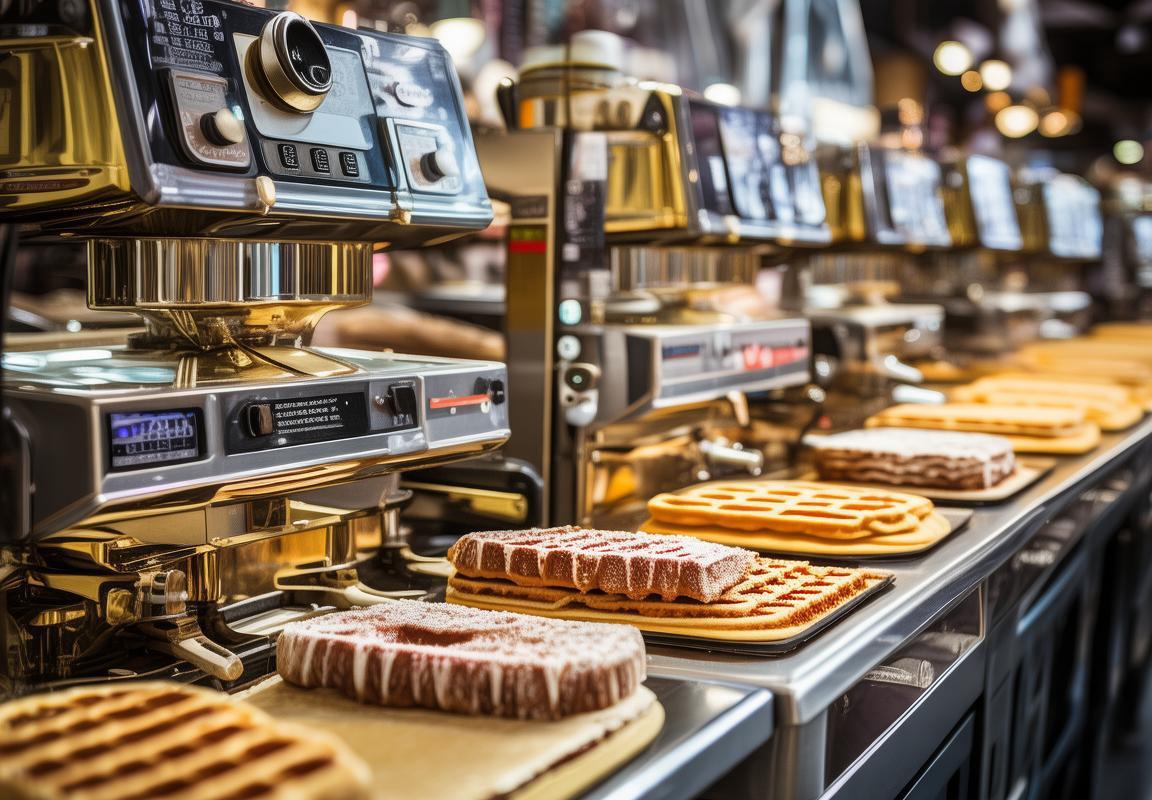
Key Features That Set Professional Machines Apart
In the bustling landscape of commercial kitchen appliances, the professional Belgian waffle machine stands out as a staple for bakers, cafes, and restaurants alike. These machines are not just kitchen tools; they are the heart of many breakfast and dessert menus. Here are some key features that differentiate professional Belgian waffle machines from their home counterparts:
-
Commercial-Grade Build: Professional Belgian waffle machines are crafted with durability in mind. They are made from heavy-duty materials like stainless steel, ensuring they can withstand the rigors of a busy kitchen. The robust construction is designed to minimize wear and tear, offering a longer lifespan than standard home models.
-
Consistent Waffle Quality: A hallmark of professional machines is their ability to produce waffles with uniform texture and depth. These machines often come with precise temperature controls and non-stick surfaces that prevent sticking and ensure every waffle is cooked to perfection. The result is a waffle that’s crispy on the outside and soft on the inside, every time.
-
Programmable Settings: Many professional Belgian waffle machines offer a range of programmable settings. These can include adjustable browning levels, timer controls, and even specific temperature settings for different types of batter. This versatility allows for customization, catering to a variety of customer preferences and dietary requirements.
-
Large Capacity and Speed: Professional machines are designed to keep up with high demand. They typically feature larger plates that can cook multiple waffles at once, significantly reducing wait times for customers. The speed at which these machines operate is another standout feature, allowing for a steady flow of fresh waffles without the need for constant monitoring.
-
Continuous Operation: Unlike home machines that often need to cool down between uses, professional Belgian waffle machines are built for continuous operation. This means they can go from one batch to the next without interruption, making them ideal for busy cafes and bakeries where speed and efficiency are crucial.
-
Easy Maintenance: With a focus on long-term use, these machines are designed with easy maintenance in mind. Many models come with removable plates for easy cleaning and feature non-stick surfaces that reduce the need for scraping and scrubbing. This not only saves time but also minimizes the risk of damage to the machine.
-
Safety Features: Safety is a top priority in commercial appliances, and professional Belgian waffle machines are no exception. They often include features like automatic shut-off after a certain period of inactivity, which helps prevent accidents. Some models also have cool-touch handles and surfaces to prevent burns.
-
Customization Options: Some professional Belgian waffle machines offer additional customization, such as interchangeable plates for different shapes and sizes of waffles. This allows for creativity in the kitchen, enabling the preparation of various waffle designs that can be a hit with customers.
-
Efficiency in Energy Use: Despite their power, professional Belgian waffle machines are designed to be energy-efficient. They often feature energy-saving modes that reduce power consumption without compromising performance, making them cost-effective for businesses.
-
Brand Reputation: Lastly, the brand reputation of a professional Belgian waffle machine speaks volumes. Many top brands in the industry have a history of producing reliable, high-quality appliances. Investing in a well-known brand can give peace of mind, knowing that the machine will deliver consistent results and have a solid support network.
The combination of these features makes professional Belgian waffle machines an indispensable part of the commercial kitchen. Their ability to produce high-quality, consistent waffles at a rapid pace, while remaining durable and easy to maintain, has solidified their place in the heart of many culinary professionals.
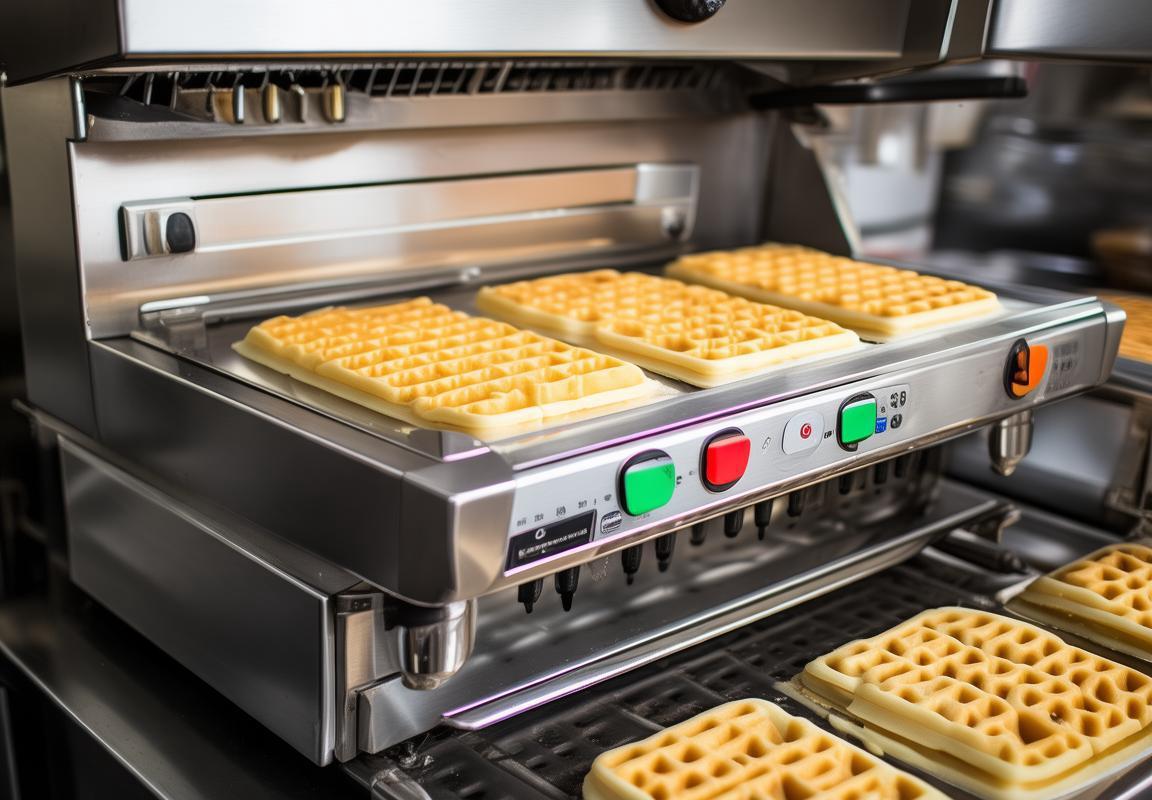
Consumer Preferences and Market Segmentation
In the bustling world of kitchen appliances, the professional Belgian waffle machine has carved out a niche for itself, not just as a staple in cafes and bakeries, but also in the homes of enthusiasts and foodies. Understanding the preferences of consumers and the segmentation of the market is crucial to the success of these machines.
The quest for quality and uniqueness is evident in the preferences of consumers who are drawn to professional Belgian waffle machines. These individuals seek appliances that not only deliver a perfect waffle but also enhance their culinary experience. Here are some key consumer preferences and market segments that have shaped the landscape of the professional Belgian waffle machine industry.
-
Quality and Consistency: Consumers are looking for machines that can consistently produce high-quality Belgian waffles, every time. This means a machine that maintains a consistent temperature and ensures even browning, which is a hallmark of a professional-grade appliance.
-
Ease of Use: While professionals might appreciate advanced features, home users often prefer machines that are straightforward and easy to operate. A user-friendly interface, intuitive controls, and minimal cleanup are highly valued.
-
Design and Aesthetics: The aesthetic appeal of a professional Belgian waffle machine cannot be overlooked. Many consumers are drawn to sleek, modern designs that complement their kitchen decor. The look of the machine can be as important as its functionality.
-
Customization Options: The ability to customize the waffle’s size, thickness, and pattern is a significant draw for consumers. Machines that offer multiple settings or interchangeable plates cater to those who want to experiment with different waffle styles.
-
Durability and Reliability: For both commercial and home users, the longevity of the machine is a key factor. Consumers are looking for appliances that are built to last, with durable materials and robust construction.
-
Safety Features: As with any kitchen appliance, safety is paramount. Features like non-slip bases, cool-touch handles, and automatic shut-off after a certain period of inactivity are highly regarded.
-
Portability: For those who enjoy hosting events or traveling, a portable professional Belgian waffle machine is a must. Consumers seek machines that are lightweight, easy to transport, and can be used on various types of cooktops.
-
Maintenance and Cleaning: The ease of maintenance and cleaning is a significant consideration. Consumers prefer machines that are easy to disassemble, with removable parts that can be cleaned in the dishwasher or by hand.
Market segmentation plays a vital role in understanding how different groups of consumers interact with the professional Belgian waffle machine market. Here are some notable segments:
-
Commercial Users: This segment includes cafes, bakeries, and restaurants that rely on professional Belgian waffle machines to serve their customers. They prioritize reliability, consistency, and the ability to handle high volumes.
-
Home Bakers and Enthusiasts: These consumers are passionate about baking and cooking. They are willing to invest in high-quality appliances that offer both performance and personalization.
-
Event Planners and Hosts: Those who frequently host events or gatherings seek portable and versatile waffle machines that can be used to serve guests in a variety of settings.
-
Health-Conscious Consumers: With a growing interest in healthy eating, some consumers are looking for Belgian waffle machines that allow them to create their own waffles with whole grains, fruits, and low-fat ingredients.
-
Culinary Schools and Professionals: Culinary students and professionals often seek out professional Belgian waffle machines for their precision and ability to produce a variety of waffle styles, which is essential for developing their skills.
By understanding these consumer preferences and market segments, manufacturers and retailers can tailor their products and marketing strategies to meet the diverse needs of the professional Belgian waffle machine market. This insight is crucial for staying competitive and satisfying the evolving demands of consumers.
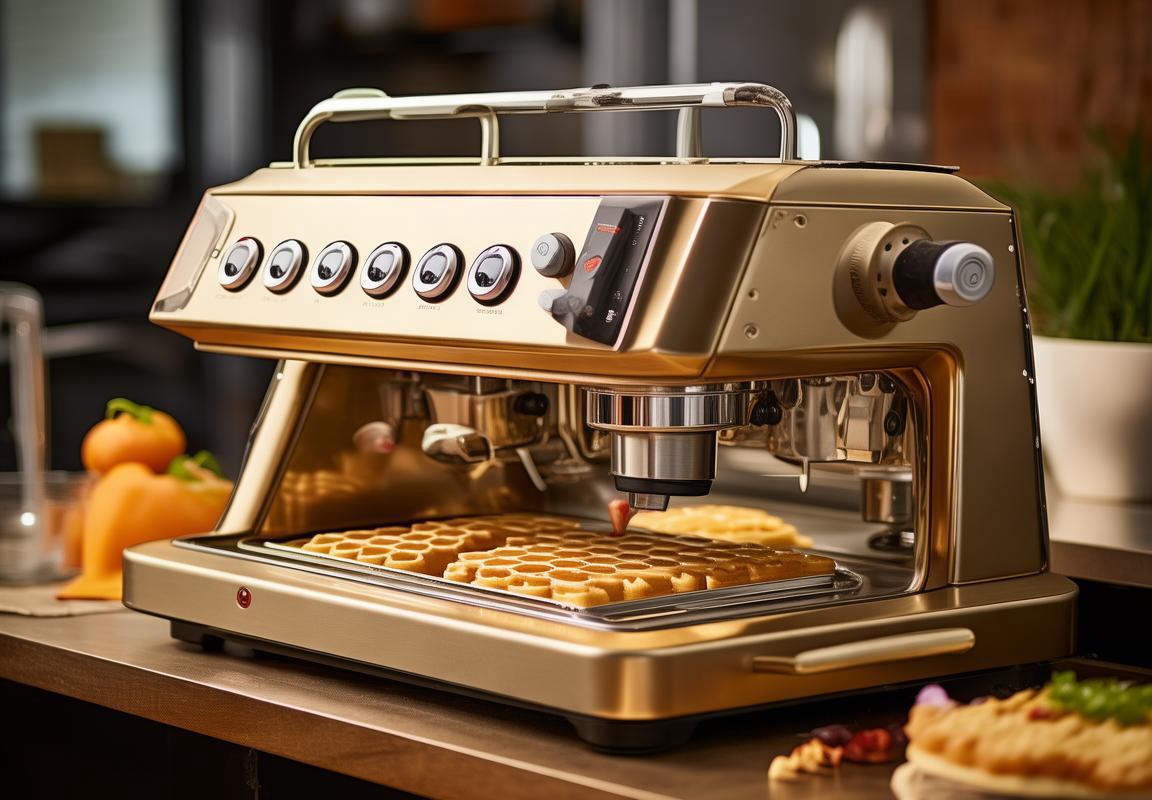
Innovations in Design and Functionality
In the world of professional kitchen appliances, the Belgian waffle machine has seen a surge in popularity, driven by a blend of culinary trends, consumer preferences, and technological advancements. These machines, designed for commercial use, stand out with a range of features that cater to both the professional chef and the casual baker. Let’s delve into the key features that set professional Belgian waffle machines apart.
The surface of a professional Belgian waffle machine is often non-stick, ensuring easy release of the waffles and reducing the need for excessive oil or butter. This not only makes cleaning simpler but also contributes to the longevity of the appliance. The non-stick coating is typically durable and resistant to scratches, maintaining the integrity of the surface over time.
Many professional Belgian waffle machines come with adjustable heat settings. This allows users to control the browning of the waffles to their liking, from a light golden color to a deep, rich brown. The precise temperature control is crucial for achieving the perfect texture and consistency in each waffle.
A consistent and even heat distribution is a hallmark of high-quality professional waffle machines. The heating elements are strategically placed to ensure that every part of the waffle is cooked uniformly, which is essential for a professional-grade product. This even cooking prevents cold spots and overcooked edges, resulting in a perfect waffle every time.
The size and shape of the waffle plates are also important. Professional machines often offer a variety of plate sizes, from the classic Belgian waffle to the smaller, more portable mini-waffles. Some models even allow for customization, with interchangeable plates that can produce different shapes and sizes, catering to diverse consumer tastes and menu requirements.
The build quality of a professional Belgian waffle machine is another distinguishing feature. These appliances are typically made from heavy-duty materials like stainless steel, which not only looks sleek but also withstands the rigors of commercial use. The robust construction ensures that the machine can handle frequent use without succumbing to wear and tear.
Ease of use is a critical factor in professional kitchen appliances. Modern Belgian waffle machines are designed with user-friendliness in mind. Features like illuminated controls, clear indicators for power and temperature, and intuitive interfaces make it easy for operators to set up and cook waffles without confusion or delays.
Safety features are a top priority in professional kitchen equipment. Many waffle machines come with features like automatic shut-off, which turns off the machine after a certain period of inactivity or once the cooking cycle is complete. This not only prevents accidents but also conserves energy. Some models also have cool-touch handles and surfaces, reducing the risk of burns.
In addition to the standard waffle shapes, some professional machines offer a variety of textures. For instance, machines with a dimple pattern can create a unique waffle with a more pronounced texture, appealing to customers looking for a distinctive culinary experience.
The ability to produce multiple waffles at once is a significant advantage in commercial settings. Some Belgian waffle machines can cook up to four waffles simultaneously, which is ideal for busy cafes, bakeries, and restaurants. This feature increases efficiency and can handle higher demand without compromising on quality.
Lastly, the versatility of professional Belgian waffle machines cannot be overstated. They are not just limited to making waffles; many models can also cook pancakes, omelets, and even other small baked goods. This versatility makes them a valuable addition to any commercial kitchen.
In conclusion, the features that set professional Belgian waffle machines apart are a combination of practicality, safety, and innovation. From non-stick surfaces and precise heat control to durable construction and user-friendly design, these machines are tailored to meet the demands of a busy kitchen environment. As the demand for high-quality, customizable waffles continues to grow, these features are becoming increasingly important in the professional Belgian waffle machine segment.
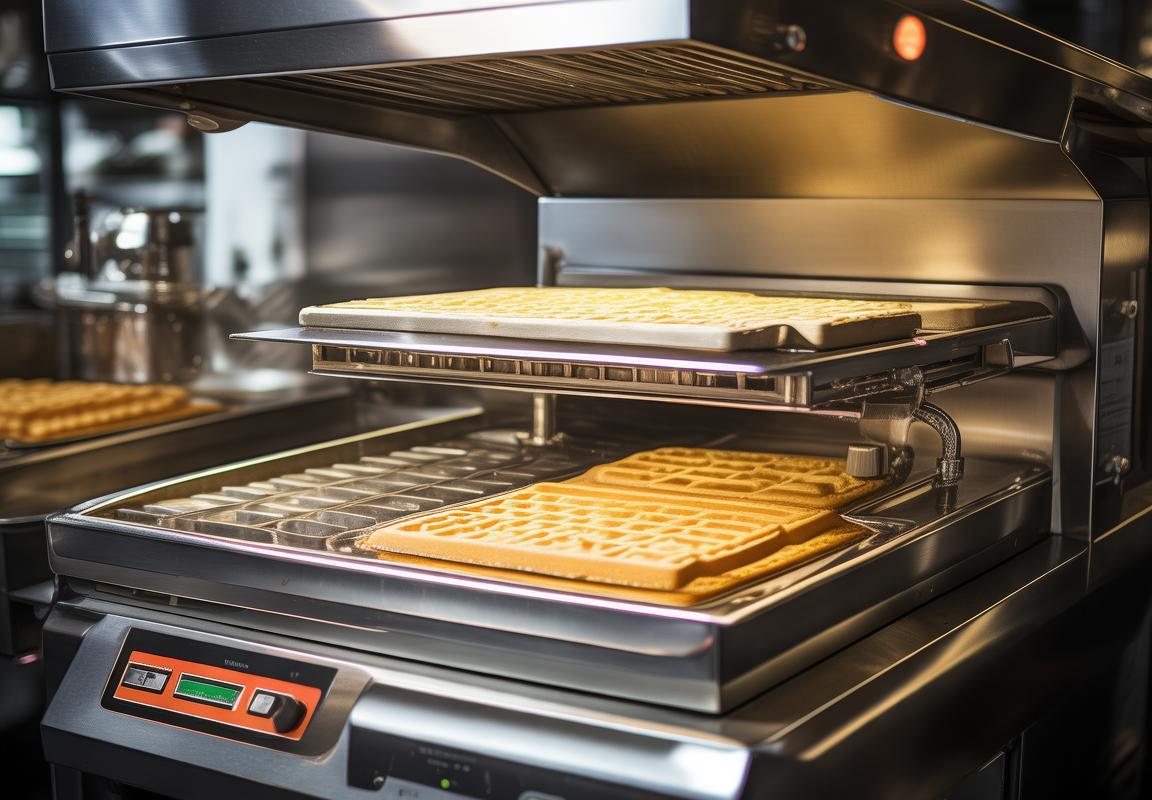
Comparative Analysis: US vs. European Markets
In the competitive landscape of commercial kitchen appliances, the Belgian waffle machine has carved out a niche for itself in both the US and European markets. These markets, though sharing a common appreciation for the delicious Belgian waffle, exhibit distinct characteristics that influence the trends and demands in the professional Belgian waffle machine segment.
In the US, there’s a strong emphasis on convenience and speed, driven by a fast-paced lifestyle and a preference for on-the-go dining options. This is reflected in the design of professional machines, which often feature rapid heating elements and intuitive controls. European markets, on the other hand, tend to prioritize craftsmanship and quality, leading to a preference for machines that not only produce high-quality waffles but also offer a certain aesthetic appeal.
The US market is saturated with a variety of Belgian waffle machines, ranging from compact countertop models to large-scale commercial units designed for high-volume operations. These machines are often equipped with non-stick surfaces that simplify the cleaning process and ensure consistent results. Conversely, in Europe, there’s a growing trend towards artisanal waffles, which often means machines that offer a broader range of textures and the ability to customize the waffle’s pattern and thickness.
In the US, the commercial sector includes a mix of cafes, restaurants, and even mobile food vendors, all of which require different features from their waffle machines. For instance, a food truck might opt for a portable, battery-operated model, while a high-end restaurant might prefer a more robust, gas-powered unit. Europe’s commercial landscape is similarly diverse, with a strong presence of traditional patisseries and cafes that serve as hotspots for authentic Belgian waffles.
Another notable difference lies in the technology and innovation. In the US, there’s a focus on smart features, such as programmable settings and digital temperature controls, which allow for precise and consistent waffle production. European machines, while also embracing technology, might lean more towards traditional elements, like manual adjustments for browning and texture, which cater to the preferences of chefs and bakers who value control over the final product.
When it comes to branding and marketing, the US market is often driven by well-known appliance manufacturers that have expanded into the professional kitchen equipment sector. These brands leverage their reputation for quality and reliability to appeal to a wide customer base. In Europe, however, the market is more fragmented, with local and niche brands holding significant market share. These brands often cater to specific segments, such as the high-end hospitality industry or specialty waffle shops.
Despite these differences, both markets share a common love for the Belgian waffle. The US and European consumers are increasingly seeking out unique and authentic food experiences, which has led to a surge in demand for high-quality, professional waffle machines. This demand is not just for the waffles themselves but also for the experience they provide—be it the sight of steam rising from a freshly cooked waffle or the smell of the crispy, golden batter.
Moreover, both markets are influenced by health and wellness trends. The US market, in particular, has seen a rise in gluten-free and organic products, prompting some manufacturers to develop machines that can produce these specialty waffles. Europe, while less focused on gluten-free options, is equally attentive to the quality and nutritional content of its food offerings.
In conclusion, the US and European markets for professional Belgian waffle machines are shaped by distinct consumer preferences and market dynamics. While the US market emphasizes convenience and speed, the European market values craftsmanship and quality. Despite these differences, both regions are unified in their passion for the Belgian waffle, driving the continuous evolution and innovation in this niche segment.
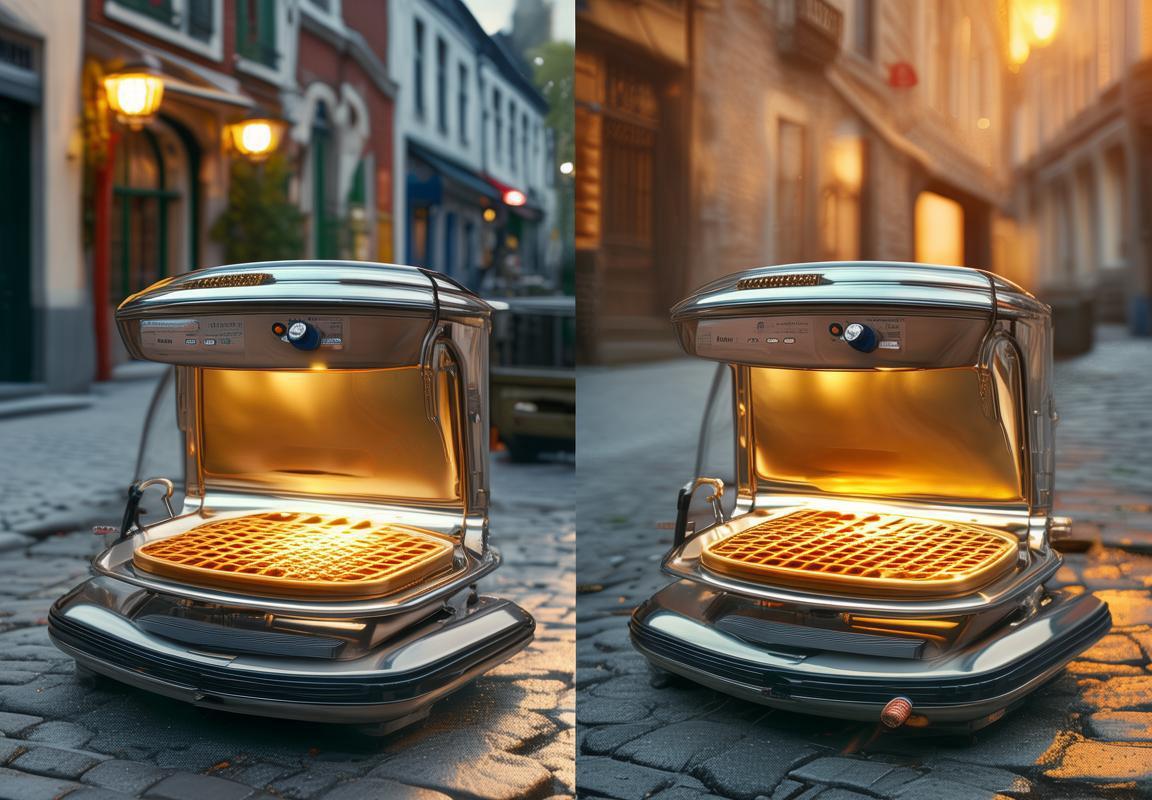
Case Studies: Successful Implementations in the Hospitality Industry
In the bustling world of hospitality, professional Belgian waffle machines have become a staple for offering a unique and delightful dining experience. Let’s delve into some case studies that showcase the successful integration of these waffle wonders in various hospitality settings.
The Waffle Café in ParisNestled in the heart of Paris, The Waffle Café has made a name for itself by specializing in the art of Belgian waffles. Their signature dish, the “Parisian Waffle,” is a testament to the machine’s capabilities, featuring layers of crispy Belgian waffles filled with fresh berries and whipped cream. The café’s success can be attributed to the consistent quality of their waffles, which is largely due to the precision and efficiency of their professional waffle machine.
The Boutique Hotel in Santa MonicaAt the Boutique Hotel in Santa Monica, the hotel’s rooftop restaurant offers panoramic views of the Pacific Ocean. To complement the stunning scenery, they introduced a Belgian waffle station, powered by a high-end professional machine. The hotel’s guests have raved about the delectable waffles, which are often customized with local fruits and artisanal toppings. The machine’s versatility has allowed the hotel to cater to a wide range of dietary preferences, from gluten-free to vegan.
The Sports Bar in AmsterdamFor the sports enthusiasts in Amsterdam, the local sports bar has become a go-to spot for post-game snacks. They’ve incorporated a professional Belgian waffle machine into their menu, offering a twist on the traditional game-day fare. The machine’s ability to produce waffles in various shapes and sizes has become a hit with customers, who can choose from classic squares to heart-shaped waffles for a personal touch. The bar’s success with the waffle machine is a testament to its ability to attract a diverse crowd seeking a unique culinary experience.
The Cruise Ship in the CaribbeanOnboard a luxury cruise ship sailing through the Caribbean, the professional Belgian waffle machine has become a beloved feature. The ship’s chefs use the machine to create a variety of waffle-inspired dishes, from savory breakfast options to sweet dessert creations. The machine’s durability and efficiency are crucial, as it must withstand the demands of a mobile kitchen that serves hundreds of guests daily. The cruise line’s investment in the waffle machine has paid off, as it has become a highlight of the dining experience for many passengers.
The Fine Dining Restaurant in TokyoIn Tokyo, a fine dining restaurant has embraced the Belgian waffle as a gourmet treat. The chef has taken the traditional waffle to new heights by pairing it with local Japanese ingredients, such as matcha powder and yuzu zest. The professional waffle machine’s ability to cook to a perfect crispness is essential for this culinary adventure. The restaurant’s patrons have been impressed by the fusion of flavors, and the machine’s consistent performance has solidified its place on the menu.
The Gourmet Bistro in BerlinThe Gourmet Bistro in Berlin has made the Belgian waffle a signature item, thanks to a high-quality professional machine. The bistro’s owner has noticed a significant increase in sales since introducing the waffles, which are often served with house-made caramelized bananas or a dollop of fresh whipped cream. The machine’s ease of use and ability to produce a variety of waffle patterns have made it a favorite among staff and guests alike.
The Family Restaurant in DallasIn Dallas, a family restaurant has found a sweet spot with the professional Belgian waffle machine. They offer a build-your-own waffle station, where customers can select from a range of toppings and fillings. The machine’s versatility has allowed the restaurant to cater to kids who might be picky eaters, as well as adults looking for a healthier option. The success of the waffle station has become a family favorite, bringing people together over a shared love of waffles.
These case studies highlight the diverse ways in which professional Belgian waffle machines have been successfully implemented in the hospitality industry. From upscale dining to casual eateries, these machines have proven to be a versatile tool that enhances the dining experience and can become a cornerstone of a restaurant’s menu.
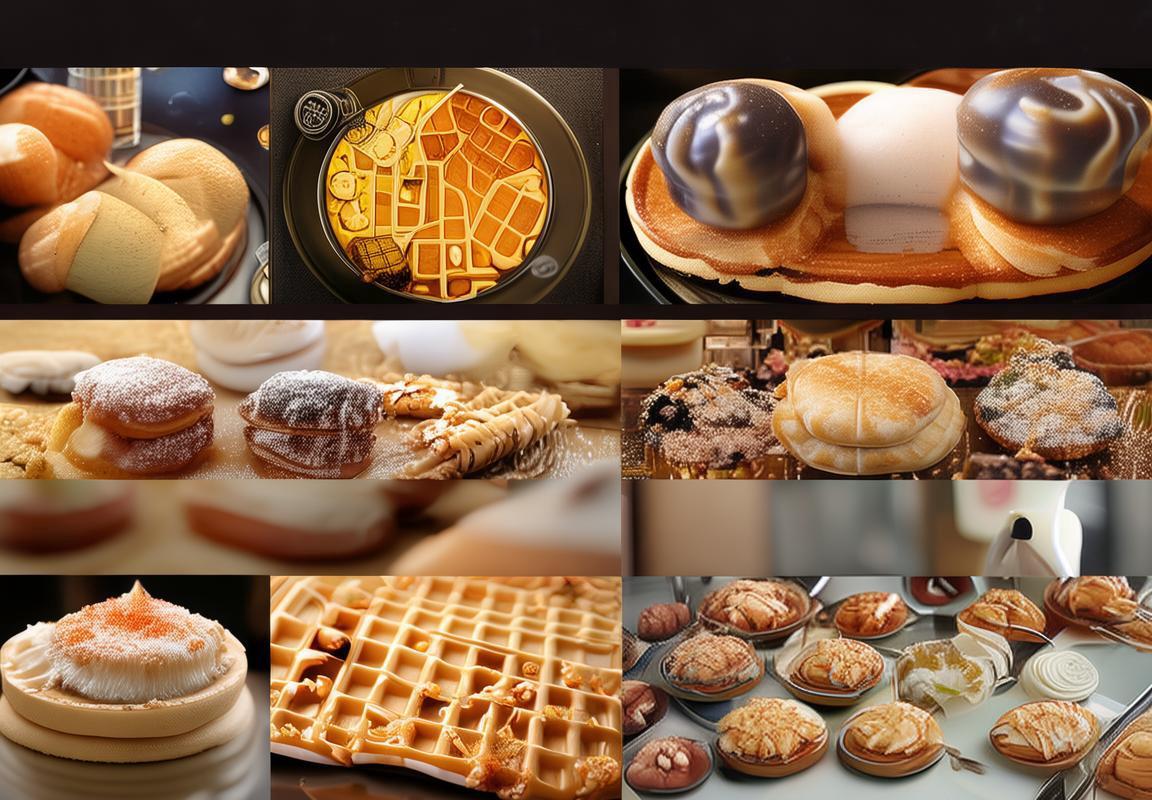
Challenges and Opportunities in the Professional Waffle Machine Space
In the competitive landscape of professional kitchen equipment, the waffle machine segment faces its own set of challenges and opportunities. Balancing the demands of high-quality output with the operational needs of commercial kitchens is crucial. Here’s a closer look at the dynamics at play:
The demand for consistency in waffle production is paramount in the professional space. Operators need machines that can churn out perfect waffles time after time, without compromising on speed or quality. This requirement pushes manufacturers to innovate in terms of heat distribution, batter consistency, and machine durability.
Maintaining a balance between cost and quality is another significant challenge. Professional waffle machines are a significant investment for any establishment, so affordability is a key factor. However, cutting corners on quality can lead to frequent repairs and downtime, which can be costly in the long run.
Energy efficiency is a growing concern in the commercial kitchen industry. With rising energy costs and environmental concerns, professional waffle machines must be designed to operate efficiently without compromising performance. This means finding the right balance between powerful heating elements and energy-saving features.
The need for customization and versatility is also a challenge. Different establishments may require different types of waffles—some might need a classic Belgian waffle, while others might want a thinner, more delicate version. Professional waffle machines must be adaptable, allowing for a variety of recipes and designs without requiring a separate machine for each type.
On the opportunity side, the rise of health-conscious consumers has opened up a new market for healthier waffle options. With a growing preference for whole grains and natural ingredients, manufacturers can capitalize on this trend by offering high-quality, nutritious waffle solutions.
Technology integration is another area ripe for opportunity. Incorporating smart features such as remote monitoring, predictive maintenance, and even IoT capabilities can not only improve efficiency but also provide valuable data to help operators optimize their operations.
The professional waffle machine market is also seeing a surge in demand from foodservice providers looking to differentiate their offerings. With a unique and appealing menu item, restaurants and cafes can attract new customers and increase their revenue streams.
Sustainability is becoming a key consideration for many businesses. As a result, there’s an opportunity for manufacturers to produce waffle machines that are made from recycled materials or are designed for easy disassembly and recycling at the end of their life cycle.
Training and support are often overlooked but are critical in the professional waffle machine space. Offering comprehensive training programs and reliable customer service can set a brand apart and build long-term customer loyalty.
Lastly, the opportunity for global expansion is substantial. As the popularity of waffles continues to grow, manufacturers can look to new markets around the world to expand their customer base and increase sales.
In summary, while challenges such as cost, efficiency, and customization persist, the professional waffle machine space is filled with opportunities for innovation and growth. By focusing on these areas, manufacturers can meet the evolving needs of the market and position themselves for long-term success.
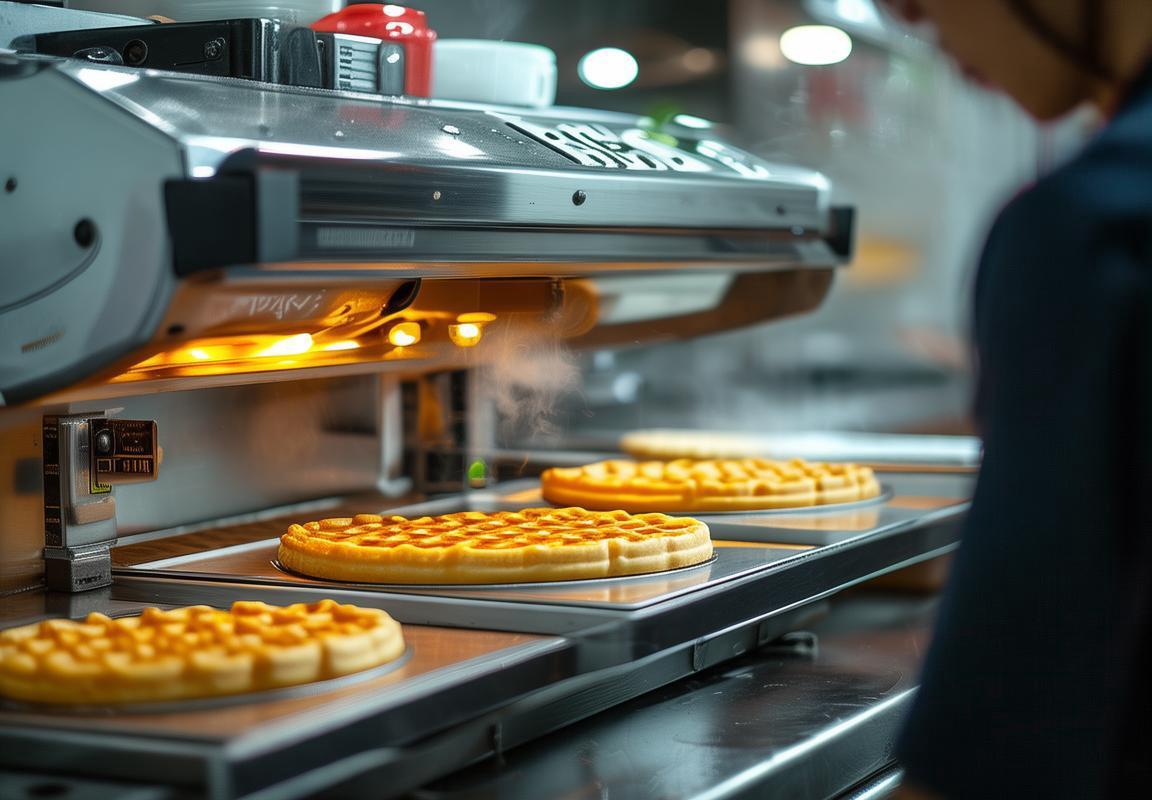
Future Projections: What’s Ahead for Professional Belgian Waffle Machines
The landscape of the professional waffle machine market is continually evolving, influenced by a variety of factors. From technological advancements to changing consumer tastes, several elements are shaping the future of these appliances. Here are some projections that could define what’s ahead for professional Belgian waffle machines.
Innovation in materials and technology is a driving force. We’re seeing a shift towards more durable and efficient materials, such as advanced non-stick coatings that improve longevity and reduce the need for frequent maintenance. Additionally, technology integration is becoming more prevalent, with machines featuring smart controls that allow for precise temperature and timing adjustments, ensuring consistency and quality in every waffle.
Energy efficiency is another key area of focus. As environmental concerns grow, manufacturers are likely to prioritize energy-saving features in their designs. This could include programmable timers that reduce unnecessary energy use and materials that are easier to recycle at the end of the machine’s life.
Customization and personalization are poised to become more significant. The ability to offer a wide range of waffle variations, from classic Belgian to gluten-free options, will be a competitive advantage. Machines may even incorporate features that allow for the creation of unique waffle designs, catering to specific customer preferences and seasonal trends.
The rise of health-conscious consumers is reshaping the market. There’s a growing demand for healthier waffle options, including those made with whole grains, nuts, and fruits. Professional waffle machines that can accommodate these ingredients and cater to dietary restrictions are likely to gain popularity.
The rise of mobile and pop-up dining experiences is also influencing the market. Compact and portable waffle machines are becoming increasingly popular, allowing for flexibility in setting up temporary waffle stations at events, festivals, and even in outdoor settings. These machines often come with additional features like removable parts for easy cleaning and transport.
Sustainability is a hot topic, and professional waffle machines are not immune to this trend. Eco-friendly designs, such as those made with sustainable materials and featuring energy-saving modes, are likely to appeal to businesses looking to reduce their environmental footprint.
The impact of social media and online reviews cannot be underestimated. As users share their experiences with various waffle machines, the market will see increased focus on user experience and ease of use. Machines that come with intuitive interfaces, clear instructions, and simple maintenance routines are likely to be more favored by both consumers and commercial users.
The rise of subscription-based services for equipment rental may also play a role. This model can help businesses manage costs and reduce the financial burden of purchasing new equipment. Professional waffle machine manufacturers may start offering subscription packages that include maintenance and upgrades, ensuring that their machines stay at the forefront of technological advancements.
Globalization is expanding the market for professional waffle machines. As international travel increases, there’s a growing interest in regional culinary traditions, including the Belgian waffle. This has prompted manufacturers to consider the cultural nuances and specific preferences of different markets, leading to the development of machines that can cater to diverse international tastes.
In conclusion, the future of professional Belgian waffle machines is multifaceted, influenced by a combination of technological progress, consumer demands, environmental concerns, and market trends. From innovative designs to health-conscious features and sustainable practices, the machines of the future are poised to offer more options and better experiences for both commercial users and consumers alike.